

NHS East Midlands NSR Perinatal Mental Health Strategy Dr Margaret Oates The implementation programme for the East Midlands Next Stage Review
Definition Perinatal Mental illness Complicate pregnancy and postpartum year Perinatal Psychiatric Services provide care for women and their infants Serious and/or complex illness both new onset and existing illness Needs infant before and after delivery central to speciality, care and services The implementation programme for the East Midlands Next Stage Review
National Drivers Mental Health NSF 2009 NICE Guidelines ANPNMH 2007 Children young people & Maternity NSF (11) 2004 (07) Confidential Enquiries into Maternal Deaths 2002, 04, 07 CNST 2000 (08) Scottish Maternity Framework 2002 Women’s Mental Health Strategy 2002 Royal College of Psychiatrists CR88 2000 All recommend that The implementation programme for the East Midlands Next Stage Review
• Specialist MDT with Psychiatrist in Mental Health Trust • All women requiring psychiatric admission following delivery should be admitted to a specialist Mother & Baby Unit • PH & FH serious mental illness should be elicited at booking • Management plans in place for those at high risk • Managed Care Networks CR88 NSF Carter Report The implementation programme for the East Midlands Next Stage Review
Childbirth and mental illness • Increased risk • Common • Serious • Some predictable / preventable • Adverse outcomes mother and infant • Different • 2 nd patient • General services do not meet need The implementation programme for the East Midlands Next Stage Review
Epidemiology Postnatal Illness • Puerperal Psychosis 2/1000 • Chronic SMI 2/1000 • Severe depressive illness 3% • Mild/mod depressive illness 10% • Adjustment disorders 15-30% The implementation programme for the East Midlands Next Stage Review
Is childbirth associated with increased risk? Number of 20 admissions 18 16 14 12 10 8 6 4 2 36 34 32 30 28 26 24 22 20 18 16 14 12 10 8 6 4 2 1 2 3 4 5 6 7 8 9 10 Weeks prior to delivery Weeks following delivery Onset of major functional disorders in the puerperium Kendell et al 1987 The implementation programme for the East Midlands Next Stage Review
Leading causes of maternal mortality CEMD 2000/02 Sepsis Early pregnancy Direct Indirect Haemorrhage Suicide/open verdict Misadventure Drug/alcohol Embolism Cardiac Psychiatric 0 5 10 15 20 25 30 35 40 45 50 Rate per million maternities The implementation programme for the East Midlands Next Stage Review
Based on known epidemiology of perinatal disorders None Mental Health Trusts sufficient psychiatric morbidity to justify inpatient unit “critical mass” EM - needs 14 beds but together they do JOINT COMMISSIONING The implementation programme for the East Midlands Next Stage Review
all Mental Health Trusts sufficient serious morbidity to justify locality specialised perinatal community team + specialist perinatal psychiatrist “HUB AND SPOKE” MBU The implementation programme for the East Midlands Next Stage Review
We have for the East Midlands: • Shared vision equitable, quality comprehensive specialised care for all • Service Model: – Hub (Mother and Baby Units) and Spokes (Specialised Perinatal Community Teams) • Managed Clinical Network • Standards • Commissioning Framework The implementation programme for the East Midlands Next Stage Review
NSR Perinatal Workstream supported by the SCG Commissioning Clinical Involvement Patient Involvement East Midlands Clinical Lead Perinatal Steering Group Lead Commissioners + Business Managers 5 MH Trusts Clinical Advisory Group – clinicians involved in the care pathway Managed Clinical Network Standards, Education, Patient Groups Links with Maternity & Health Visiting Services, Adult Mental Health The implementation programme for the East Midlands Next Stage Review
Patient engagement • Five Expert Patient Groups • Five focus groups • Four themes – access, specialism vs. generalism, continuing specialised care, distant vs. local services The implementation programme for the East Midlands Next Stage Review
Patient Themes • Need improved training, information and advice for non-specialists (and patients) • Specialised skills and resources essential – care/treatment, mother/baby interaction, patient/professional relationships • Follow-up support – transition back home, continuity of care, continuing care needs • Willing to travel to MBU out of area but local community services essential The implementation programme for the East Midlands Next Stage Review
Acute Psychoses 2/1000 Mother & Baby Unit Severe/complex 2/1000 Outreach Service Chronic SMI 2/1000 Consultation & advice “inpatient equivalents” Hub & Spoke integration Serious illness 30/1000 Specialist Perinatal Community Teams “admission vulnerable” M Referral & Management Guidelines C Mild/Moderate 10% Treatment Primary Care “PND” Specialist MW/HV N Psychological Therapies I Adjustment disorders C distress Improved skills HV & 15% - 30% Primary Care Teams P Good Psychological care Basic education all staff Promoting Maternal-child Compassionate understanding Mental health All women The implementation programme for the East Midlands Next Stage Review
Progress to Date • Clinical and Patient Engagement • Initial Impact Assessment drafted • Capgemini working with PCTs on current expenditure and modelling costs • Service standards circulated for comment • Specification for Inpatient and Community Services being drafted The implementation programme for the East Midlands Next Stage Review
Next Phase • Point prevalence census • Market Assessment • Produce Options for Delivery • Consider commissioning arrangements The implementation programme for the East Midlands Next Stage Review
Recommend
More recommend